Cyberpunk 2077: A Candle in Sunshine [OPEN SPOILERS]
By lapsariangiraff 37 Comments
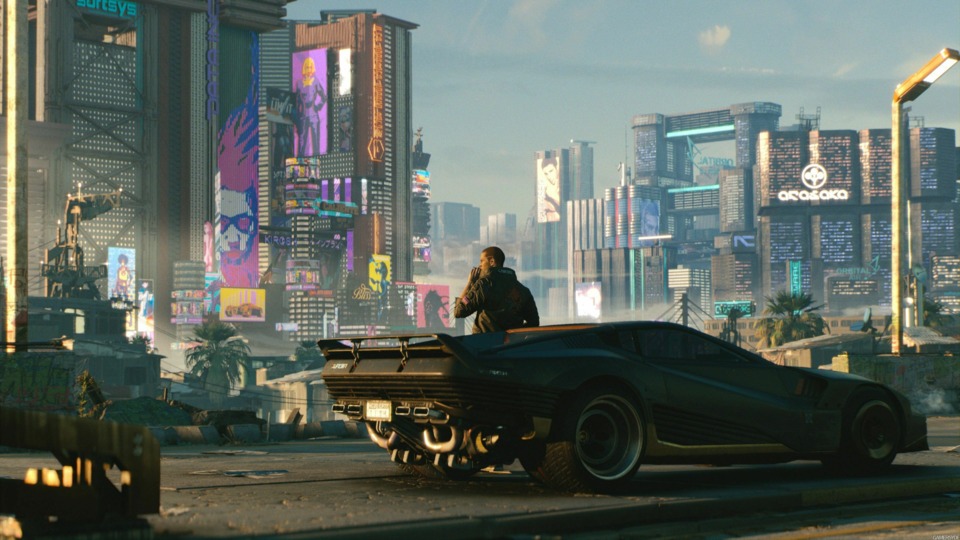
Yes, this many months later, we’re still talking about Cyberpunk. Or at least, I still have some thoughts on it. I completely understand if anyone doesn’t want to read another hot take on the matter—I’m exhausted too—but I’m hoping that with this sober distance, a slightly more productive conversation around this game can take place. That, and I can’t stop myself from writing something longer about Cyberpunk. This isn’t enthusiastic inspiration from the Muse, mind you – more like one of those nagging errands that just keeps picking at the back of your head, week after week, month after month, until you finally clean your damn shed and find rats living there.
I beat Cyberpunk 2077 a month ago. After months of having to react to the controversy of the day—and there was always a new one for a while there—there’s a chance to construct and articulate my own thoughts, rather than react to the newest thing. So as much as I’d prefer not to, because I’m already so tired of this game, I feel the need to write this up, and hopefully I never have to think about it again.
A Disclaimer
I'm not going to jump into the trans discussion in this piece—I've already done that plenty in the forums, and I want to discuss the game as a whole. The critiques thrown CDPR's way are valid, and I don't think it's very controversial to say that those of us unfamiliar with why someone could be uncomfortable should listen to the trans people this affects? Rather than reflexively say, "well I didn't see anything wrong with it." Between Cyberpunk, Last of Us Part 2, and Hogwarts Legacy, a cynical part of me wonders if 2020 was the year "gamers" learned that trans people exist—any sort of phobia or misinformation is nothing more than studied ignorance, after all. Sure, they were aware that transgender folks existed, but they never really had to confront those transgender folks actually being in "their" games and speaking openly about wanting better representation. The "discourse" around this issue occurring in gaming communities is less a conversation and more one side speaking while the other holds their hands over their ears yelling "lalalalalalala I can't hear you!" That's not to say there aren't productive conversations to have about transgender representation in games, it's just that... those tend to happen between people who give a shit. And there's a small, yet vocal subset of game fans who clearly don't, which made my time attempting to explain the issue in these forums straight up exhausting. (Ironically, it's often those who say, "I really just want someone to explain what the actual problem is," who are looking for no such thing.)
To that subset: don't worry, I'm not going to talk about it at all for the rest of this piece. If you genuinely want to talk about this, feel free to DM me.
With that out of the way...
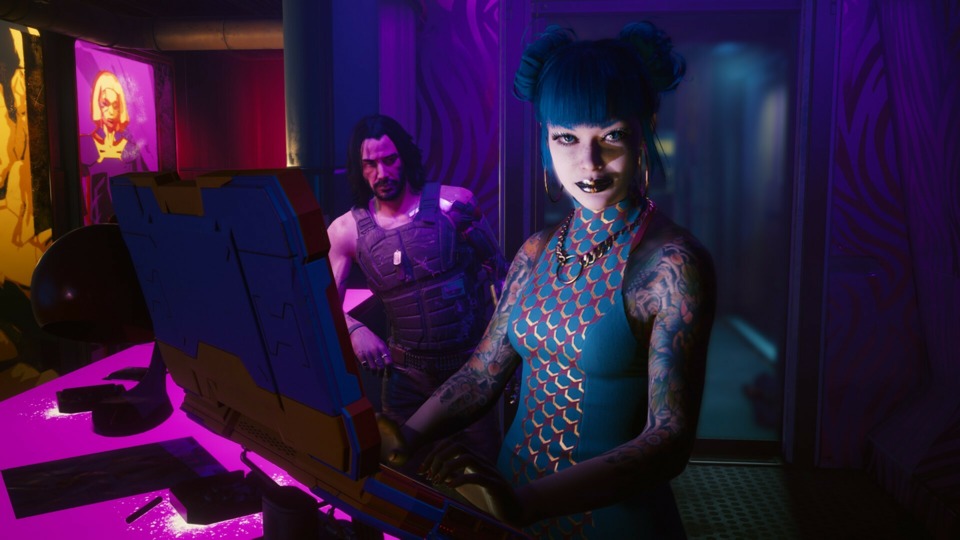
Where Do We Even Start
Someone must have made this comparison already, but Cyberpunk has so much going on, and yet so little, that it can act like a Rorschach test for whoever’s talking about it. Post-release, there are so many tire fires surrounding and within the game that which one you want to talk about is, in itself an important decision that frames the entire discussion. To paraphrase a few I’ve seen: is Cyberpunk the beginning of better consumer protections and refund policies in video games? The end of day one patches? A watershed moment to rethink how we over-hype games in our marketing (like this great piece from Gamer_152 focuses on)? A tipping point in the deep ugliness of some video game fandoms, willing to trigger epilepsies in folks who dare point out issues in the game they’re tilting at windmills for? Is it the death of modern CDPR’s reputation? Or, just focusing on the game outside of its cultural context, is it just an okay game that was over-hyped? Or a masterpiece flawed by its rushed production schedule and botched console release?
I want to talk about that last bit, particularly, because in the second wave of Cyberpunk critiques online, I’ve seen this sentiment pop up more and more often—that this is an incredible game marred by technical issues. Implying, or outright saying, if you have a modern PC this is going to be a great experience.
That is absolutely not the case.
A Seemingly Random but Actually Crucial Tangent on In N Out

Like a lot of y’all, I live in California. Around here we have a chain of burger places called In N Out. It’s alright! I enjoy the Double Double, I think the fries are kinda thin papery garbage that turn to ash in your mouth, and drinking their milkshake is a near-masochistic experience as you punish your throat with some of the densest ice cream and dairy you’ve ever tried to suck through a straw. Seriously, you need the suction force of say, an airplane’s cabin decompressing to get the last of the milkshake out through a straw. So, not the best burger place here, but an alright option, and I admit that it is synonymous with the West Coast.
However, when I went to college on the East Coast, where no In N Out locations exist, the franchise took on an almost messianic unattainable quality. New York kids who had never been to one wished they had been, and the Cali kids who went to school there claimed that it was the best burger place ever, egging on this disproportionate, platonic ideal of fast food burgers. Heck, when an In N Out wrapper was found in Queens and photographed for Twitter, a full-on amateur Twitter investigation was commenced (the perp was found—they had brought In N Out on their flight from San Diego) It was fascinating to watch a fast food chain become some kind of symbol or totem to these guys, and when it came time for me to weigh in on these conversations, I’d just say that I liked it to not rain on their parade. Inaccessibility, paired with some overenthusiastic evangelists, created unrealistic expectation for In N Out, when Five Guys was sitting right there! (Five Guys is the best fast food burger, don’t @ me)
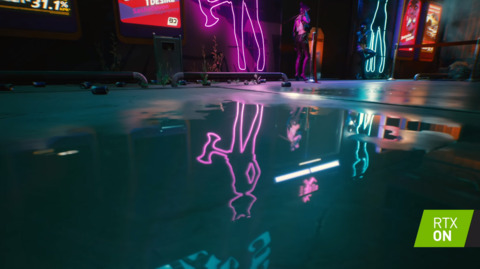
A similar phenomenon is brewing around Cyberpunk on the PC. The luxurious trailer footage of Cyberpunk, paired with the kitchen sink of PC graphics features and technologies, (DLSS! SharpeningFX! RTX! THE GAME OF THE FUTURE IS NOW!) has created this impression that the game is some kind of technical marvel or juggernaut, that those with PCs capable of running it are lucky to have. Again: inaccessibility + overenthusiastic evangelists = bloated expectations.
Because I can convince myself it helps me with work, but really because I’m wasteful with my money, I have one of the fastest consumer PCs one can build right now. I have an RTX 3090 paired with a Ryzen 5950x (the extra cores do genuinely help with compile times), with 64 GB of RAM. In other words, I have burned disgusting amounts of money for the privilege of playing Cyberpunk in its utmost glory, and I can tell you what that’s like in one sentence.
It’s a mess.
Sorry guys, Cyberpunk is rough on every platform. In order to run the game smoothly at 60 frames a second, you have to crank DLSS waaaaaay up. DLSS is not a “feature” here, but a necessity. At upscaled 4k, with everything on, and raytracing set to medium, you’re looking at a wildly uneven 60. At DLSS set to “Performance” or “Ultra-Performance” you get a semblance of the framerate you’d want from a PC game, minus frequent CPU spikes from driving around the open world taking you down to 40 FPS, but the image is genuinely really grainy. Cyberpunk uses a lot of resolution-dependent effects, so a lot of the smoke, lights, and distant environments can look fuzzy and blurred when you have DLSS leaning all the way into performance. On the other end of the scale, DLSS Quality and Balanced modes look far sharper, but the game’s performance tanks into 30ish territory again. Even turning down the resolution target from 4k to say, 1440p or 1080p doesn’t get you the performance you’d want. (It gets to like, 70-80, but still uneven.) Because of these headaches, I spent my entire playthrough ping-ponging between “Balanced, Performance, Ultra-Performance” and “RTX Off, RTX Medium, RTX Psycho”, and was never satisfied with any of them, either due to the framerate or the muddiness of the image.
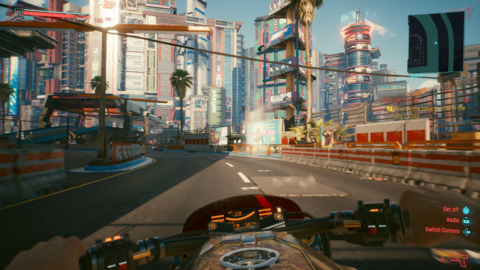
Once you look past all of that, and turn off the chromatic aberration, motion blur, and film grain, (or like me, turn everything up to native 4k and highest settings for a 12 FPS slideshow and “science”,) the game as a whole is still… ugly. Some of that could be the art style, one that embraces brown, gray, and orange industrial wastelands when it’s not using every nit of brightness on your monitor for the neon urban areas, but it’s probably more likely a “death by a thousand cuts” kind of deal. There are areas that stand out (the opening hotel heist, the parade, downtown, Afterlife, WOW,) but the primarily color I remember is brown, and a constant over-bloom lighting effect. And say what you will about Crysis, a game that also brought hardware to its knees in its day, but it also looked damn good in exchange. This, though? Feels less worth the tradeoff.
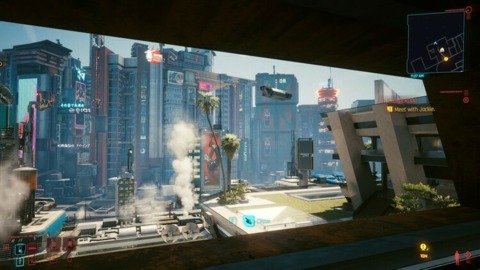
Even from an artistic, rather than technical standpoint, Cyberpunk disappoints. A common sentiment is that this is partly the fault of the source material—that by attempting to be the ur-Cyberpunk game based on one of its oldest pen and paper incarnations, what used to be transgressive now just appears generic. That may be part of it, but when I read Neuromancer or Do Androids Dream of Electric Sheep? I’m not just enjoying them because they “did it first” in some bizarre dibs-calling on the entire genre. I’m enjoying them even today because they have something to say, and the world backs up their messages. In Cyberpunk, the most prominent visual landmark at any time is the architecture of Night City itself, but this architecture, while there’s a lot of it, misses the mark. I highly recommend reading this architect’s critique of Cyberpunk’s spaces—but in short, Night City has the aesthetic of raw functionality, but isn’t actually serving any function, turning the architecture into a glamour. Mind you, a “glamour” in the older sense of the word: an illusion, a spell. Now, there’s nothing wrong with that. All games are smoke and mirrors. It’s just that with stuff like this (see below) all over the place, likely the result of crunch, this spell breaks all the time. For a game that relies so heavily on the verisimilitude of Night City holding, this is crippling.
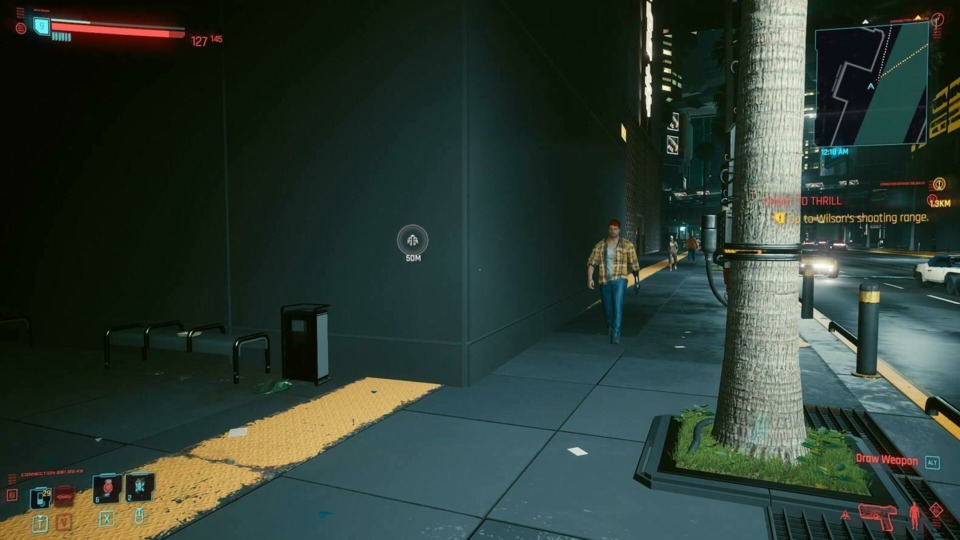
Also, there were still several game breaking bugs while I played it in February, so buyer beware.
The Game Part (In A Nutshell)
Past the technical concerns, which are present on every platform, Cyberpunk is an empty, empty game that is constantly shouting at you, waving at you to look at it, distracting you from that emptiness. If you play through the critical path, ignoring all the sidequests, or even some of the story missions, you can probably beat the game in 10-15 hours? All you really need to do is go through the opening 3-4 missions leading up to Johnny Silverhand’s introduction, then mainline Takemura’s quests, take Arasaka’s offer, and then you’re set. And the game is aware of this thin critical path, to the point it’ll yell “hey, don’t walk past this point unless you want to finish the story!” Now, Witcher 3 did this, but that came after so much more story it felt more like a fair warning than a “hey, don’t dive here, the water in this pool is actually 1 foot deep!”
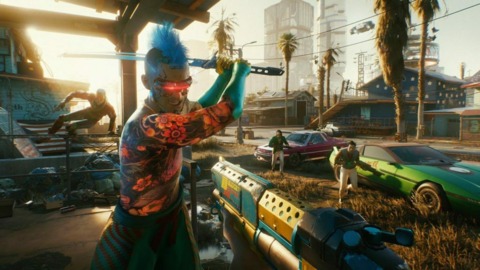
Characters will constantly call you with urgent matters in the middle of other urgent missions, or, most hysterically, during important dialogue moments. Now, you can say “yes, I’ll be right over,” knowing damn well that you won’t be over for at least 30 minutes, or you can say the sane human thing of “I’m busy, can I come by later?” Except sometimes that actually lets you do the mission later, and other times it cuts the mission off entirely (this is what cut off any chance for my female V to romance Judy, by the way). These missions constantly stepping on each other’s toes gives the impression that a lot is happening and Night City has so much to do, but really, it’s just poorly paced to create that illusion. Because between those cacophonous moments (at the end of one mission only to get 5 other text messages or calls) is a great emptiness. Not a contemplative, intentionally sparse emptiness like No Man’s Sky or Death Stranding, but a laundry list of boilerplate sidequests and groups of Bad Men to kill, one that is deeply boring, but compulsively playable. “Ah, just one more map icon. Just one more. Then maybe I can upgrade my Cool to one more point out of 20!” Whether or not the missions are fun (they aren’t) isn’t their point – the appearance of the missions and the utility of the missions is their point. The appearance, because you can’t be a modern AAA game without icon vomit on the map, and those sure are a lot of icons that give players a lot to do (on paper, even if it’s just the same activity x100). The utility, because their only purpose is to make the numbers go higher.
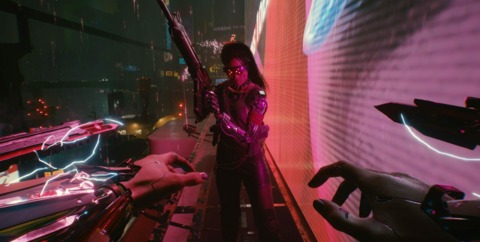
How are those numbers? They’re alright. Mapping out a specialization for my V was some of the most fun I had with Cyberpunk, as I got to make a pretty synergistic “Cold Blood + Mantis Blades” build that gave me a lot of health and extra damage every time I killed a guy or went into slow-mo, which was… a lot. So that was okay, and seeing my dumb build (HEAVY ATTACK LUNGE. HEAVY ATTACK LUNGE. HEAVY ATTACK LUNGE. SWIPE SWIPE SWIPE SWIPE SWIPE) in practice was fun for the first few hours it took off.
The problem is that there was 30 hours left.
In Doctor Faustus, (the novel by Thomas Mann, not the original Christopher Marlowe play,) a fictional Devil explains Hell as people running between unbearable fire and unbearable cold, with nothing in the middle. The damned souls run back and forth forever, swapping from an intolerable state to another, crucially, always seeing the other as a potential refuge. Cyberpunk put me in a pretty similar spot, jumping back and forth between the combat and my character’s skill tree as my primary motivators, but neither being quite compelling enough for me to be satisfied by. The core combat and stealth isn’t interesting enough on its own without the game’s RPG abilities, so I played it primarily to level up my character. But the character levelling only really comes into play in the combat, and the skill trees aren’t that interesting, so... it’s only a matter of time until the core loop comes tumbling down.
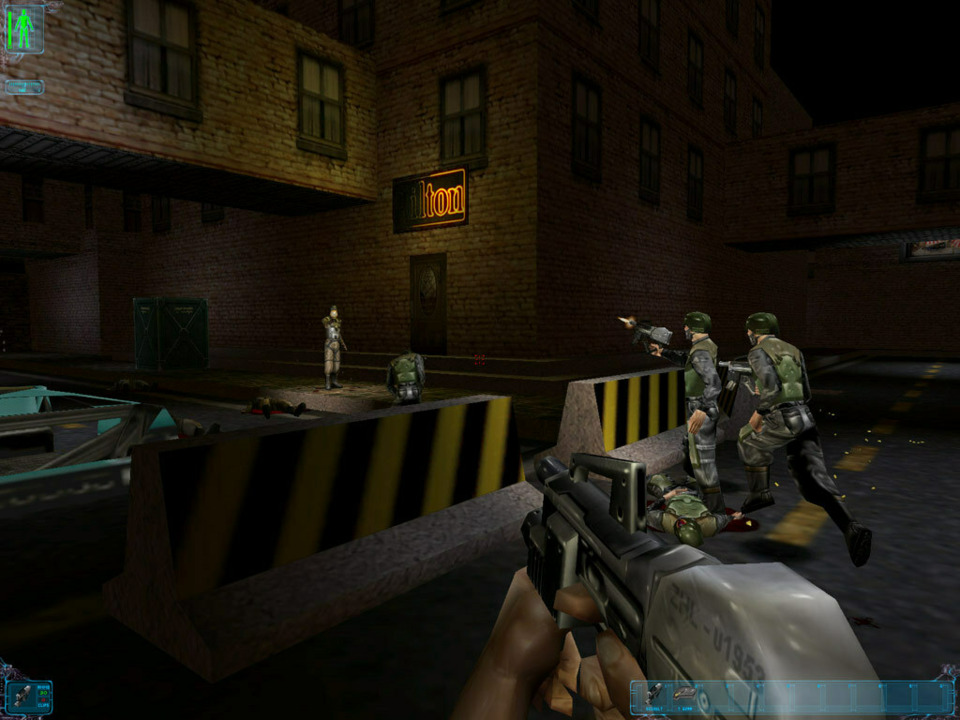
On Power Fantasies
When the original Deus Ex came out, some reviewers pointed out that, while having such a wide range of options was exciting, each individual gameplay style, by necessity, couldn’t match that of its immediate peers. The shooting in Deus Ex was awful, and the stealth was much better but still not up to Thief, or Metal Gear Solid. The magic was in how it all came together, the exploration of different options.
Similarly, every option in Cyberpunk 2077 is… underwhelming. If one of the core conceits is to fulfill your fantasy of being a badass deck-punching netrunner, or a ninja warrior, or a hard-boiled merc – Cyberpunk meets none of these. The combat tends to have a bell curve of enjoyment—near the beginning, you don’t have enough tools to play with to do more than “shoot man” or “walk behind man, strangle man,” but near the end, you are so powerful you don’t have to engage with any gameplay loops at all.
Take three completely separate paths. I went for a stabby stabby blade build with zero thoughts given to stealth. It started with me actually having to be pretty careful about my engagements, since I had a pretty glass cannon (read: 0 points in Body) build. That was interesting, even if the melee v melee combat felt awful, and versus gun combatants it was just “mash the attack button over and over.” Near the middle, I got some Mantis Blades, some nice mods on those, and the slow-motion cyber implant, so I felt like I had a lot more control over the fight, which again, was interesting. Then, near the end, I was so overpowered that I didn’t need to worry about any abilities at all, and just mashed attack + sprint with my brain turned off. Again, that was fun at first, but there was 30 hours left. And there’s something kind of strange about the ultimate reward of a combat-driven game being… not having to engage with the combat as deeply?
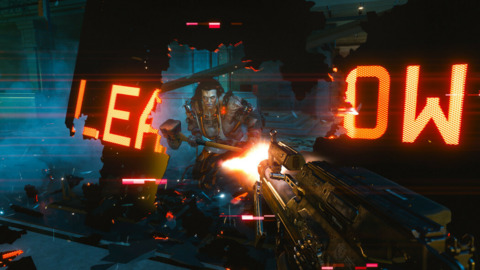
Another example. What if you want to be a stealthy infiltrator? A cool character who’s in and out before anyone ever noticed they were there? I’ve certainly had a lot of fun playing like that in other games, but here, there’s not a lot going on in the stealth. The layouts are the classic “well you can go in the vent here or jump up the side of the building there” tropes from Deus Ex, but moment to moment, you are just walking behind guys, strangling them, and hiding their bodies. But wait, it gets less interesting! Because, even if you play a non-lethal character, you unlock a mod for your weapons that can make them all non-lethal, so you can take your incredibly overpowered silenced revolver, and just headshot every guard with 0 consequences. Great.
“But Giraffe!” you say. “The cyberpunk genre is all about hacking and augmentation! What about the cool hacking?” The hacking route in this game is equally dull in its power fantasy, as I watched my friend stream and play the game that way. Your most valuable tools from the beginning are distracting enemies with nearby objects hacked, and blinding their optics. Near the end, however, you unlock Contagion, which lets your hacking damage spread from one target to another to another until the whole room is dead, and from one button press. Once again, in a disturbing trend in this game, the reward for playing it and levelling up is having to play it less.
The Mantis Blades, Gorilla Arms, and Monowire are all neat, but they are all just cooler looking versions of existing weapon archetypes. They are not radically new augmentations that unlock entirely new ways of playing, ala a Deus Ex, but just one more upgrade in the same stale combat loop.
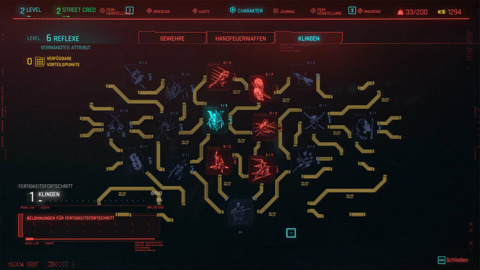
So, in short, throughout the entire game’s run-time, I didn’t enjoy most of the story missions (because they dealt in the same indulgent “follow this character as they talk and check out how well their face animates while you’re still not playing the game” pattern as a lot of recent releases), I didn’t enjoy the copy-paste compounds of enemies, I didn’t enjoy the combat or stealth or hacking, and in the end, the skill and customizations you could give your character were disappointing. So why did I even play this? I kept playing on the thinnest, most fragile promise of the late game skills and abilities: “Maybe, if I play enough. Maybe, if I grind enough, I’ll unlock an ability that makes this game fun.” But no, those systems and those abilities were just distractions for what I was actually doing the whole time: grinding. And it frickin’ worked.
By the time I emerged from my sidequest binge-leveling, my character was level 50 with most of her abilities (Blades, Cold Blood, Stealth) around 17 out of 20 proficiency, and most of the game’s story content was still in front of me. But playing all that side stuff first, and engaging with the story and only the story, only brought its problems into sharper relief.
The Setup
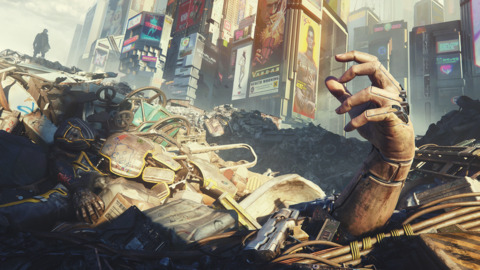
The emptiness of Cyberpunk’s systems, open world design, and gameplay extend into the story as well. That’s not to say there isn’t a lot going on—there is. It’s just that when you sit down afterward and ask, “what is Cyberpunk about?” a lot of potential answers come up, but none that are fully satisfying or make a through-line in the entire work.
In the beginning, it’s one of the most traditional crime game stories of all time: the price of infamy and power as a young merc makes their way into criminal stardom. Early on, the game seems intent on asking V and her starry-eyed partner Jackie, “what would you do to become a legend in Night City? Would you willingly walk into an early, likely violent death for a shot at fame?” This can be seen with your first conversation with Dexter Deshawn, the moment at the bar with Claire where she tells you how each drink is named after a dead Night City merc. This theme is then further hammered in when your big-time heist goes wrong and Jackie dies in your arms (easily one of the best moments in the game). When you die and come back to life, it’s almost like a second chance, isn’t it? “You’ve seen how high the price for fame in Night City is – knowing that now, do you still want to pay it?” Near death experiences are a powerful moment, in stories and life alike, to reconsider, reset your positions. Will V, with this new clarity, still pursue the top of the merc pyramid, or is there something more worth holding onto in life now? That’s a good setup for a story. However, this is all promptly forgotten and discarded when Johnny Silverhand appears, though he does bring in much more interesting questions and conflicts.
Johnny Silverhand
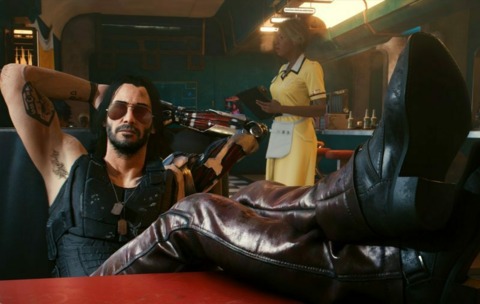
On paper, Johnny Silverhand is the best part of this game.
Let’s start with his relationship to V. For those reading a way-too-long Cyberpunk post despite having not learned who Johnny Silverhand is…? (highly unlikely,) Silverhand is a rockstar from 50 years before V’s time. He nuked Arasaka Tower, and was captured for his trouble. Arasaka removed his soul and placed it in their captivity, until V unwittingly plugged the same biochip into her head. When she got shot, the chip started replacing her personality with Johnny’s to save the body. This means that, like a lot of great character conflicts, these two are inherently at odds. V and Johnny cannot live at the same time for long – one has to go.
However, the cards aren’t in V’s favor. The chip is all that’s keeping her alive, so removing it would kill her. If she keeps it in, her personality will be entirely replaced by Silverhand in months. And she’s seeing him, talking to him, in her head. It seems like a normal conversation, and V pushes back hard, but a scientist familiar with the project (Hellman) points out that if Johnny starts to influence her thinking, she won’t be able to tell what is her thought and what is Johnny’s.
Honestly, this whole set up is fantastic. The conversation after you capture Hellman is one of my favorites, as you’re interested to hear what Johnny has to say, but you’re worried the longer you let him talk, the more he espouses his world view, the more that’ll become V’s world view. You don’t trust your dialogue options, you genuinely don’t trust yourself. It’s good stuff.
Understandably, the game’s narrative shifts from the theme of “Night City legends, wOOOOOO!” (though I think Johnny is an interesting foil for that, since he is a legend, at once an aspirational yet warning figure for V) to questions of identity. What makes you you? Is it ethical for companies to have the capability to own a person’s very personhood ala the Soulkiller, or the dolls in Clouds? Every sidequest starts to tie into this, in a way that’s understandable but a little too on the nose for my taste. Every mission seems to end with Johnny saying something like, “WOW, THIS FAMILY IS BEING BRAINWASHED INTO BECOMING DIFFERENT PEOPLE. REMIND YOU OF ANYONE!?”
Again, all on paper, that’s all good. The problem?
Johnny Silverhand suuuuuuuuuuuuuuuuucks.
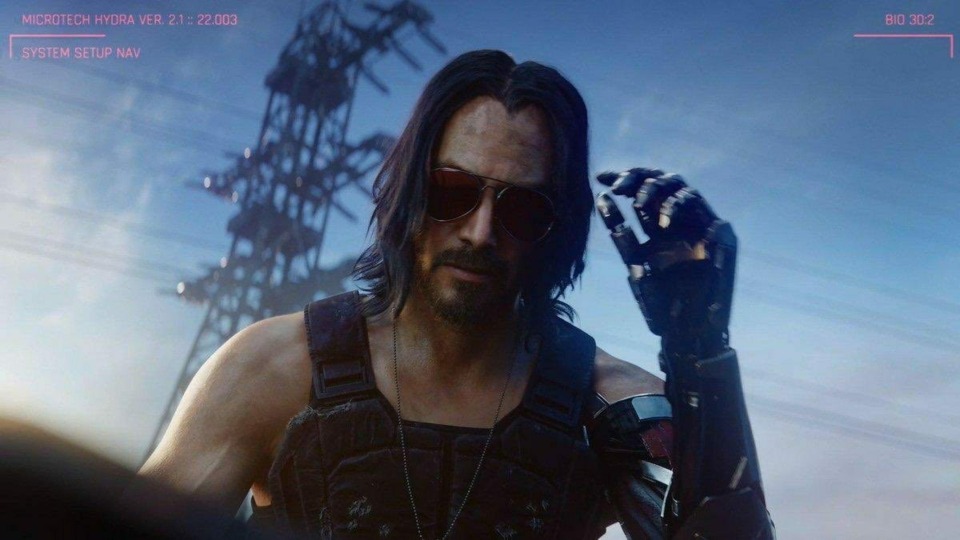
That’s a really dismissive, harsh claim, so don’t worry, I’m backing it up!
First, on the more logic-y side of things, Johnny Silverhand’s relationship to the world makes little sense, or what’s there makes the world seem incredibly shallow. This guy is 50 years old, remember, and everything in Night City is apparently similar enough 50 years later for him to still comment perfectly fluently on! For instance, when working with the Tyger Claws for some side missions, Johnny’ll give you lip (he does that, a lot,) about how “oh, the Tyger Claws are super dangerous, don’t fuck with ‘em.” To demonstrate how absurd this is, imagine if 50 years from now in a major metropolitan city we still had the exact same gangs and no new ones at all. Or conversely, think 50 years back. “Man, watch out for the Warriors, they’re the roughest toughest kids around!” It makes it feel like literally nothing has happened since Johnny left. In his flashbacks, the city looks exactly the same, with the exception of one (admittedly awesome looking) city vista from a club.
On a similar note, almost all the NPCs around you can’t stop talking about Silverhand. He’ll lament being the last of the “real rebels, maaaaan,” but then everyone and their mother still remembers and fawns over Silverhand. So, the emotional reality of him feeling left behind, like the resistance he gave Arasaka made no difference and he was just paved over and forgotten anyway? Makes no sense. Much like my Tenet piece, I feel inclined to note this isn’t a “plot hole,” this is the baseline emotional state not tracking. And if we can’t intuitively track the character’s feelings… that’s a problem.
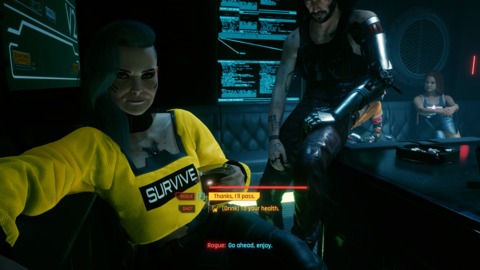
Later NPCs, like Rogue and Kerry Eurodyne revolve their entire character arcs around Johnny Silverhand. You spend a lot of time giving Johnny Silverhand temporary control of your body so he can, at the most pressing, gain some intel, and at the least pressing, go on a date with his ex. Between these late game moments, and the sheer number of times you’re just treated to the Johnny Silverhand show, it starts to feel like he’s the main character of the story, and not you. And that’s… alright, I guess. It’s not ideal in a game where you create your own custom character and therefore have an attachment to how they act and roleplay, only to be shoved to the sideline as Keanu Reeves is given center stage.
I swear, no one ever said “no” at any point in the production of this game. “Should we do a licensing deal with Microsoft even though we’re not going to release in time for this generation likely? Sure!” “Kojima wants a cameo, should we give it to him? Heck yes!” “Grimes? Yeah!” “GLaDOS? Uh-huh!” “What about this random YouTuber who could star in the ‘my cyber dick is on fire’ mission?” “No…” “Oh thank God.” “…way am I turning that golden opportunity down!” And Keanu Reeves is the cyberpunk guy so we’re going to cast him as the most important character in the game. We got Keanu Reeves in the game, and that’s huge, so we’re going to let him promote his motorcycle company and have stocks in the company and show up on stage at E3 and be in every trailer because V isn’t important! Keanu Reeves is! V is the boring guy/gal on the cover with a gun – Silverhand is the guy who this story is really about.
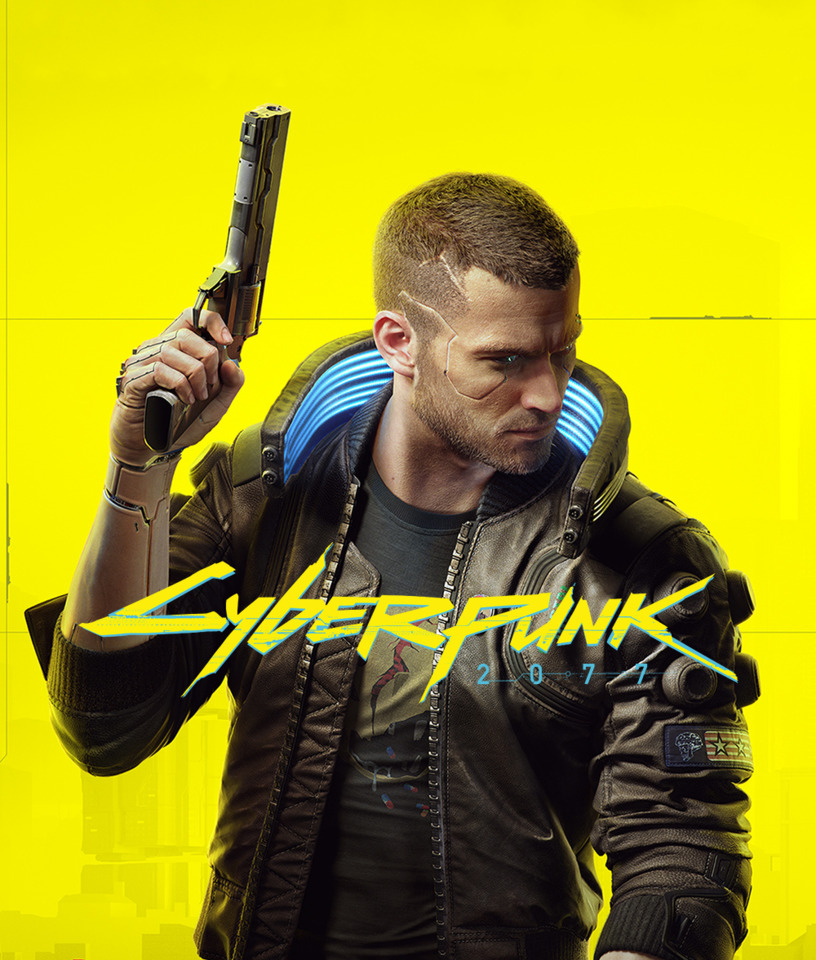
And that’s a problem, isn’t it? If the player isn’t the main character in an RPG? There’s a real chain of passivity going on here. I’ve complained about passive main characters before, but here it’s a whole new level. V is a passenger in Johhny’s story, who in turn is a passenger to the plans of Rogue and Alt (or Panam or Arasaka if you choose those routes). This whole game is other, cooler people telling you what to do. It can work in a linear action game, but when V is the one making decisions, that gets dicey, right? But to make it seem like you still have agency, Johnny will just present you important decisions in dialogue. Before the last mission, nothing changes (depending on the order of missions you’ve done, you may have known where Mikoshi was for a while) except another character (Vik) shaking V and telling her to make a decision! Except even then, V doesn’t make a decision, she’s taken to the roof where Johnny tells her the options she’s got. And the best one is him and V going in alone, or him taking over your body to go to Arasaka tower with Rogue. They should have just made him the player character, honestly, since it’s his story they’re the most interested in telling.
I can’t with this guy. My brain wants me to write in two entirely separate directions. One, I could point out how wrong it is to sideline the main character’s story in a damn narrative-based role playing game, and point out that if you look at their development, Johnny is actually the one that changes the most and receives the most setups and payoffs (Alt, Rogue, Samurai, the full circle of Adam Smasher) and V gets nada. Two, I want to just move on and point out that, this could still all potentially work if Johnny Silverhand’s character worked at all, but he’s actually a vapid, obnoxious prick, past the Keanu Reeves of it all.
Yeah, let’s talk about that second one.
The Emanuel Swedenborg of Cyberpunk
It’s always a little annoying encountering pet characters in video game writing. You know the ones – Kai Leng in Mass Effect 3, Tiny Tina in Borderlands 2. Characters that the writer clearly loves, and will drop anything else the narrative is doing, or make intentionally turn the player character into a temporary idiot to give their pet character snappier comebacks. What makes these characters grating, rather than story-shattering, however, is that they aren’t the main characters of these games.
Silverhand, unfortunately, is the core of Cyberpunk, narratively, and thematically.
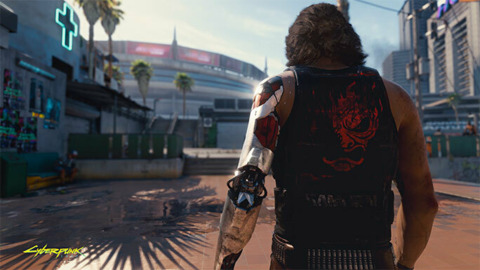
He is, in many ways, the mouthpiece for many of the game’s themes. He’s the angel on your shoulder, who tells you what to do and when, he’s one of the only characters who openly opposes the corporations in Night City, whereas everyone else exists in their own individual rat race, more or less accepting the dystopian status quo. If you want your character to have a revolutionary streak, Silverhand’s the only place to turn. Because of all this, the words he has to say have a lot of weight. Is there a poet beneath that leathery exterior? Is Silverhand an effective anti-hero?
No, not at all. Silverhand has about as much depth as your stoner classmate in high school. He has a sense of romanticism (more on this soon,) but always in the vaguest sense. He’ll wax lyrical about how a street musician is playing the guitar with roughshod technique, but “feeling.” He’ll be vaguely nostalgic or melancholy about his exes, even when his flashbacks show he had little to no respect for anything other than their sexuality at the moment. He alludes to deeply held reasons he hates Arasaka, when in the end it boils down to “they kidnapped my no-strings ladyfriend and she became an AI.” He will yell at you (and you have no choice but to listen,) over and over, how he’s looking out for the little guy, how he wishes he wasn’t taking over your body because it’s like how the corporations rob people of their peoplehood. But in reality, he stands for nothing.
There’s a side mission where you’re following the data trail of a digital philosopher type called Swedenborg-Riviera. He writes vaguely revolutionary gibberish, much like a certain Rocker Boy. As you progress, Johnny starts to make fun of you. He calls you an idiot for following this trail of clues, and it’s implied that he may be jealous that people listen to this “revolutionary” and not him. When you reach the end of the trail, however, you learn that Swedenborg-Riviera is actually just a hacked fortune telling machine that spews out gibberish on the net for people to follow, as a prank.
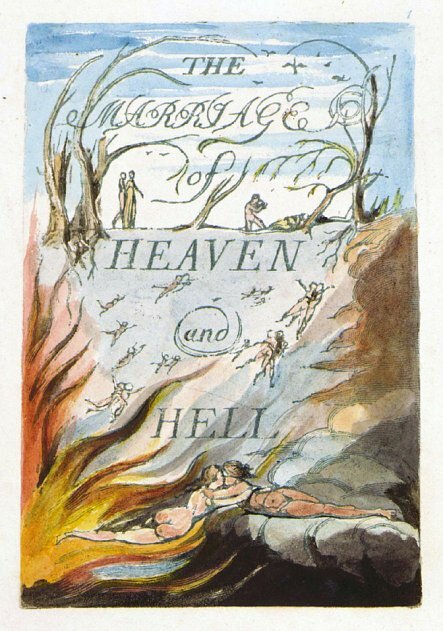
Now, players familiar with 18th century theologians may have seen this one coming: Emanuel Swedenborg was a well-known writer who wrote a book called Heaven and Hell in 1758. He had some valid critiques of the church, but he was also, mmm, how do we put this, a bit of a nutjob cult leader? William Blake, a creator of his own Christian mythology, was reportedly a fan of Swedenborg’s writing right up until he actually attended one of his sermons. Afterward, well, as he writes in the "Marriage of Heaven and Hell:"
“I have always found that Angels have the vanity to speak of themselves as the only wise; this they do with a confident insolence sprouting from systematic reasoning.
“Thus Swedenborg boasts that what he writes is new; though it is only the contents or index of already published books.
“A man carried a monkey about for a show, and because he was a little wiser than the monkey, grew vain, and conceived himself as much wiser than seven men. It is so with Swedenborg; he shows the folly of churches, and exposes hypocrites, till he imagines that all are religious, and himself the single one on earth that ever broke a net.
“Now hear a plain fact: Swedenborg has not written one new truth. Now hear another: he has written all the old falsehoods.
“And now hear the reason: he conversed with Angels who are all religious, and conversed not with Devils who all hate religion, for he was incapable through his conceited notions.
“Thus Swedenborg’s writings are a recapitulation of all superficial opinions, and an analysis of the more sublime, but no further.
“Have now another plain fact: any man of mechanical talents may from the writings of Paracelsus or Jacob Behmen produce ten thousand volumes of equal value with Swedenborg’s, and from those of Dante or Shakespeare an infinite number.
“But when he has done this, let him not say that he knows better than his master, for he only holds a candle in sunshine.” (40)
Being an insufferable English lit type, I was expecting this “twist” from a fair bit away. What I wasn’t expecting was for Silverhand to turn around and say, (paraphrasing) “Man, that’s really funny! A perfect prophet for Night City, the philosopher it deserves! Please don’t take it down, V!” And so, you get the choice to leave the hacked machine spewing nonsense to the unsuspecting masses or to take it down. And the revolutionary wants you to leave the nonsense up. Out of, what? Nihilism? Isn’t fake philosophy that misinforms the public (who would otherwise be receptive to hearing concrete steps on how they can affect change) pretty fucking counter-revolutionary?
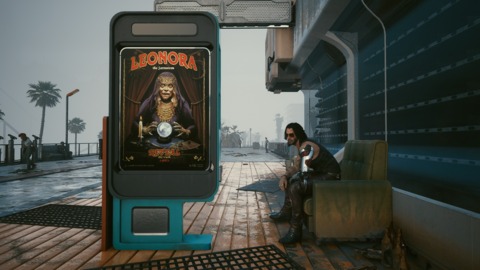
And in that moment, I got it. Up to that point I was struggling with Silverhand, struggling with summing up this empty husk of a game that was doing so much I’d have to address, but leaving me with literally no feelings, excitement, or ideas every time I put it down. But when he smugly asserted that this trash was what Night City deserved, I got it. This game depends, in all its variations, all its endings, all its moments, on at least some emotional attachment to Silverhand, but…
Silverhand is the Emanuel Swedenborg of Cyberpunk 2077.
Seriously, re-read that Blake quote, replace “Swedenborg” with “Silverhand,” and tell me this doesn’t track. Johnny Silverhand, the guy who will shout at his bandmates and loved ones about how he’s the only one willing to fight Arasaka.
“A man carried a monkey about for a show, and because he was a little wiser than the monkey, grew vain, and conceived himself as much wiser than seven men. It is so with Swedenborg; he shows the folly of churches, and exposes hypocrites, till he imagines that all are religious, and himself the single one on earth that ever broke a net.”
So it is with the church of Johnny Silverhand. Johnny Silverhand, the guy who talks all the time about revolution, but only in vague aesthetic terms of feeling or solidarity of the rights of the individual, never meaningful concrete change. (See here Lindsay Ellis’ video about Rent, which discusses how “fight the power” Broadway shows appeal to vague feelings of liberty and romanticism, because discussing concrete injustice would make it unpalatable to a bourgeois audience, AKA the people who can afford theater tickets.) He says he cares about freeing this city, but he will happily keep Swedenborg-Riviera around because it validates his negative opinion of the world. A guy who opts for the most shocking or badass action at any point, whatever makes the biggest scene or him the most sympathetic, regardless of internal worldview. One second bragging about the size of his cock, the next being soulful about music and grief, the next a firebrand. His most drastic action, nuking Arasaka—literally accomplished nothing other than created the aesthetic of resistance. The tower was rebuilt. He’d be more useful as an organizer alive. But no, he had to cement his legend forever.
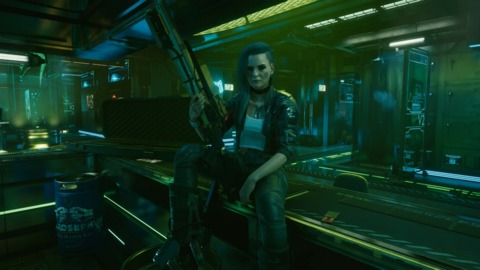
This feeling continues to deepen the more you go down the “Silverhand and Rogue” ending route. After 80 hours of running around, the game is in full “look how far we’ve come” mode. Earlier, Silverhand sits V down near where his body was dumped, and reminisces about how much they’ve grown together, how much of a better person he is now. Yet it falls flat, because when I look back on the journey we’ve undertaken together, I remember dozens of hours of copy-paste sidequests with occasional jeering from Silverhand. I can count the number of meaningful moments with him on one hand, let alone moments of his character shifting. (Outside the motel after interrogating Hellman, outside the Voodoo Boys club, the Pacifica hotel after he takes you on another bender and reminisces about his war buddy.) And when you let Silverhand take your body over one last time, Rogue can’t stop telling him how mature he’s become. So, with this new maturity, this new respect for life (which I genuinely can’t track other than, concern for V’s life? That’s the only thing I see change with Silverhand.) what do they do?
They literally do what got Johnny killed in the first place and go back to Arasaka Tower to blow it up again.

WHAT’S THE DEFINITION OF INSANITY AGAIN?
I can’t believe it. I can’t believe it.
Johnny and Rogue have grown so much… that they’re making the exact same mistakes. Nothing has changed at all. And oh, whoops, Rogue died this time! Go figure! She was living a safer life, Silverhand wanders back into her life to guilt her for surviving, and she falls for it hook line and sinker and puts herself in a situation where she’s killed. Unbelievable.
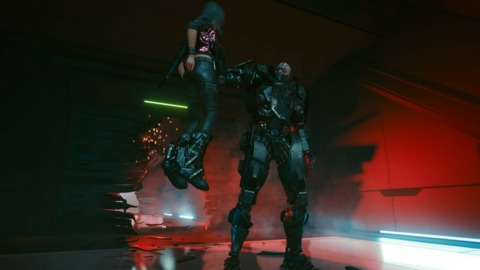
This last mission was where I started to really lose it, in case you can’t tell. Armed with my new reading on Silverhand’s character, his self-congratulatory dialogue with Rogue hits my ears especially harshly: “Fuck plans, back in the day, you’d just do some lines, pick up your iron, and do what needed to be done!” Again, he is actively endorsing the idea that if you want to change things, don’t think about it too hard! Just feel it, man. And again, this thinking gets the love of his life killed. Not that anyone calls him out on that. No, they just get mad at Adam Smasher for doing exactly what you’d expect him to do.
As their AV (flying ship thing) shows up, this badass music kicks in, Rogue is sauntering with a big gun, and they both board the ship. With a view of the city at night, Rogue and Johnny spend a good minute just circle jerking each other as the ship flies toward Arasaka Tower—“WE’RE ABOUT TO GIVE THIS CITY A WAKE-UP CALL!””ONE SECOND YOU’RE IN THE GUTTER AND THE NEXT YOU’VE GOT THE WORLD AT YOUR FEET.” Ugh. You two deserve each other.
The Good, The True, and the Beautiful
Charitably, there’s a line that at least clarifies Silverhand (though it doesn’t come close to redeeming him in my eyes.) At some point with Rogue, Silverhand says, “fuck the true and the good, we only cared about the beautiful!” And this makes sense. He’s of course referring to the Platonic ideals of the good, the true, and the beautiful, (justice, truth, art,) and a guy whose character class is all about changing the world through rock and roll would obviously believe in the beautiful above all else. The art. The aesthetic. He wants to look cool, and say cool shit, and make cool things, and he wants to act out of pure feeling, unrestrained. Now, I’m no Platonist, but I think there are, just philosophically speaking, outside of the game even, significant drawbacks to that approach.

I’m reminded of “Ode on a Grecian Urn” by Keats, which, because I’m not the most attentive student, I remember mostly as a critique of aesthetic. During 19th century, there was a lot of cultural and intellectual attention being paid to the relationship of art to aesthetic, and Keats, in writing about this beautiful Grecian Urn, critiques this high taste when it is separated from bodily feeling (Keats looooooved the body). In short, he sounds like he’s praising it, but really he’s calling it cold and joyless. The most famous lines are at the end,
“Beauty is truth, truth beauty, -- that is all
Ye know on earth, and all ye need to know.”
In short, to put aesthetic and beauty above all else is stifling. Cold. Shallow. And in a way, isn’t that this whole game? The NPCs in the world are as lifeless as the figures drawn on the urn. It’s about a lot of things, if by about you mean throwing in half-assed references and not following up on them in the main narrative. It’s about sex work, it’s about capitalism, it’s about AI, it’s about what it means to be human, it’s about nostalgia, it’s about the importance of individuality in a world meant to crush this individuality down. It’s about these things because there are references and moments where these are all discussed, even as it never comes to a cohesive whole or world view. It’s not the story that’s important, it’s the aesthetic of having importance that’s important. Cyberpunk, much like its posterchild, Johnny Silverhand postures like it has a lot to say, but in reality says nothing that you haven’t heard before, and articulated better.
Cyberpunk’s accomplishments hold, as Blake said, “a candle in sunshine.”
The End
Hey, if you read through the whole thing, thanks a lot! ~6800 words is no joke, time is valuable, and I appreciate it. As always, I also post these to my blog, Lapses in Taste.
A couple of things:
Yes, I have watched all the endings. I like the “bad” ending with Arasaka, easily the most thought provoking and appropriately dark ending. The rest didn’t particularly resonate with me. This game leaves a lot of loose threads, and the ones they choose to resolve, or perhaps how they choose to resolve it left me pretty unhappy.
Parts of this read like one of the more negative things I’ve ever written, which on the one hand I feel bad about, but on the other it’s how I honestly feel about the game? I’m not going to give anyone crap about liking Cyberpunk, though.
With that massive endnote aside, months later, with the hype and backlash settled, how do you find Cyberpunk? Did you push through the issues on release? Like the story? Hate it? Waiting for some of these promised updates to make a noticeable difference?
